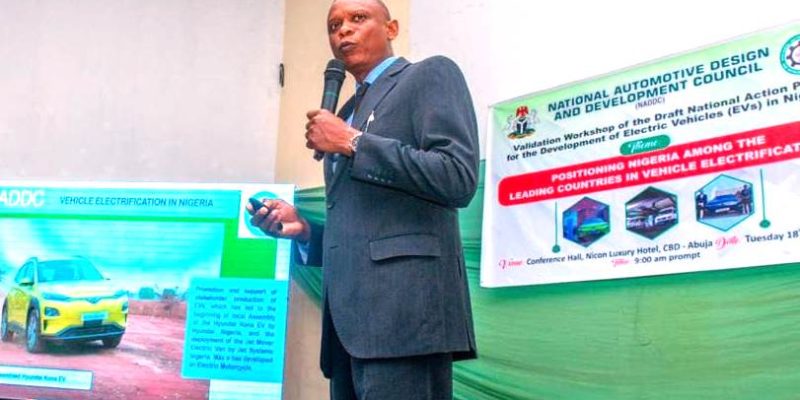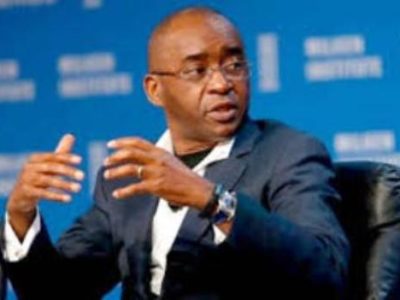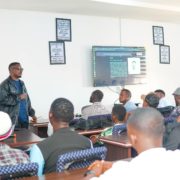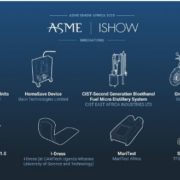Nigeria is set to become a hub for vehicle electrification and achieve its net-zero emissions by 2060 as the Electric Vehicle (EV) Development Plan in Nigeria enters the final stage for ratification and implementation.
RELATED: NADDC unveils 2,322 Nigerian built CNG buses for RTEAN
According to Director General of the National Automotive Design and Development Council (NADDC), Jelani Aliyu, while speaking at a validation workshop recently in Abuja, the plan is expected to be adopted and ratified within weeks.
The EV Development Plan includes a timeframe, specific percentages, and targets that must be met with focus on promoting local production of electric vehicles and a target of at least 30% local production.
Aliyu stressed the importance of embracing advanced technology “to uplift the lives of hundreds of millions of the nation’s citizens even as he reiterated the NADDC’s commitment to vehicle electrification in Nigeria, which has resulted in the local assembly of the Hyundai Kona EV and Jet Motors Electric Buses and Vans.
The NADDC boss said the “Action Plan is dedicated solely on strategic development of the Vehicle Electrification ecosystem in Nigeria: to provide the necessary fiscal and non-fiscal incentives, programs and initiatives aimed at expediting the mass production of electric vehicles and development of an effective nationwide charging infrastructure.
“To also enable the ubiquitous attainability and sustainable ownership of the very many different types of these zero emission forms of transportation by both public and individual end users.”
According to Aliyu, the NADDC has demonstrated its dedication to developing applicable advanced solutions with the development of the 100% solar powered EV charging stations at three universities, Usmanu Danfodiyo University Sokoto (UDUS), University of Nigeria Nsukka (UNN), University of Lagos (UNILAG) and at the NADDC Headquarters in Abuja.
Collaboration with private sector to deploy charging points
Part of this roadmap already has the NADDC exploring collaboration with the private sector to deploy charging points along highways and road so as to make the EV ecosystem more robust and reliable.
The EV Development Plan mandates federal, state, and local governments, private companies executing government contracts to purchase and patronise EVs so as to drive adoption across the country.
The Permanent Secretary, Federal Ministry of Industry, Trade and Investment, who was represented by the Director, Industry Development Department of the Ministry, Adewale Rasheed, said the workshop would guarantee inclusiveness and synergy among stakeholders in the development of the Action Plan.
His words: “This validation workshop will lead to the development of the detailed and comprehensive plan for the development of electrical vehicles in Nigeria.”
Also, Executive Vice Chairman of NASENI, Dr Bashir Gwandu, expressed the commitment of his agency to partner with the NADDC promoting research and sustainability in the development of EV value chain.
The NADDC boss argued that the need to have cost-effective and sustainable transportation solutions due to the higher costs of petrol and diesel has increased the value proposition of EVs and compressed natural gas (CNG) vehicles all of are readily supported by abundance of renewable energy and natural resources, such as lithium and gas.
Automotive Industry Development Plan Bil
Aliyu also called on the government to pass the 2023 National Automotive Industry Development Plan Bill to provide required legislative umbrella to lure foreign direct investment (FDI) in the development of indigenous vehicles with local content and intellectual property tailored to Nigeria’s extreme conditions.
The vehicle ecosystem can further be strengthened by a policy thrust to fund Vehicle Finance Scheme (VFS) targeting the acquisition of EVs through affordable nationwide staggered payment scheme and the enforcement of Executive Order 003 mandating the procurement of locally produced vehicles by government ministries, departments, and agencies (MDAs) as well as private companies working as contractors.





























